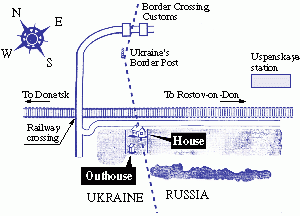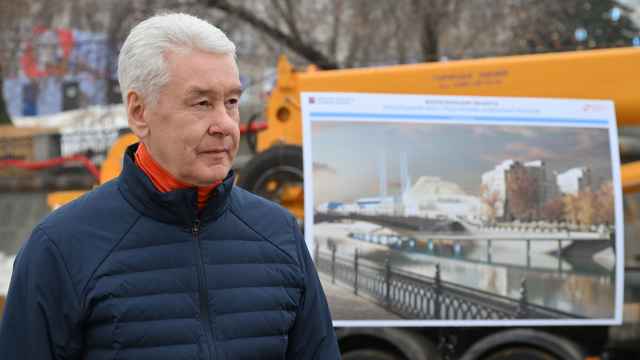This article was taken from the Moscow Times archive and was first published on Dec. 12, 2000.
USPENSKAYA, On the Russian-Ukrainian Border — For eight years, Leonid Dobronogov has crossed the Russian-Ukrainian border a dozen times a day without even leaving his house.
Dobronogov has the bad luck to be the owner of a house that has the border running through it. When he lived in the Soviet Union, it didn't make much difference, but now one half of his house is in one country and the other is in another. There was even a time when a visit to his outhouse required a passport to keep the local customs officers at bay.
Dobronogov may be the unluckiest resident of Uspenskaya, but he's just one of a number whose lives, and deaths, have been complicated by the border.
On the edge of the village is a large border crossing, where guards check every car and all passengers on the trains that pass through daily. A few hundred meters away, the invisible border runs into the main road in the village, slicing it in half.
While most of the street and the village of 1,200 people remains in Russia, 13 houses fall on Ukrainian territory and Dobronogov's house is split down the middle.
The road is called Zheleznodorozhnaya Ulitsa, which translates as Railway Road, but it's more of a muddy track that dips so treacherously that it's easier to walk along the railroad that runs parallel. Nothing marks the actual border — unless you count Dobronogov's outhouse — and crossing the international border is a matter of stepping over a muddy puddle.
"That's the border," sneers Olga Myzichkova, who lives on the Ukraine side a few doors down from Dobronogov, as she beckons toward a hole in the ground.
"Day and night we have to carry our passports," says Myzichkova, complaining that the border guards watch with binoculars for victims to extort money from. Fines are common, and for villagers it's unquestioned that the money goes straight into the guards' pockets.
With the nearest shop, the nearest cemetery, railway station and school in another country — never mind that if they trip they'll fall into Russia — the villagers are easy targets.
"They sit there on the bench [near her house] with their automatics," Myzichkova says with disgust. "They squeeze us and squeeze us [for money] … we're like a free accordion."
Children going to school are regularly stopped and searched, villagers say.
Even the cow that Myzichkova's family owns causes problems. Their one cow lives in Ukraine but grazes in Russia, and accompanying her along international mud tracks isn't easy.
"They don't demand passports of the cows but they demand them of us," says Myzichkova's father, pensioner Alexei Kucherenko.

Even without the border hassles, life wouldn't be easy in Uspenskaya, which lies between Russia's Rostov-on-Don and Ukraine's Donetsk. There is little work for the few under pension age, pensions are minute, and families eke out a bleak living, but the border has made things even worse.
"They're the smugglers," says Myzichkova, pointing out a couple of her neighbors carrying huge bags of flour on bicycles. She says the smugglers, who bring goods from Russia into Ukraine, provide a service because the nearest shop in Ukraine is more than four kilometers away.
"Three villages and no shops," says Kucherenko, "and all around pensioners."
Many of those pensioners, his daughter says, have been doing their own smuggling and setting up shops. She remembers with nostalgia a pensioner who sold bread, pasta and "sweet things" until the border guards clamped down.
The border, and the poverty, have brought a steep rise in crime, says Kucherenko. Many of the houses have guard dogs, and one, a couple of doors into Ukraine, has a simple sign scrawled in chalk on the gate: zlaya sobaka or mean dog.
The Kucherenkos have their own guard dog, one that rabidly bounds to the limits of the chain around its neck at the first sniff of a stranger. Inside they have another dog that was cuddled up to four kittens in the warmth of the kitchen as Yevdokia, Myzichkova's mother, sat chopping up a bowl of baby onions and garlic.
Despite their physical presence a few doors into Ukraine, the Kucherenkos live in a mixed-up zone. They live by Russian time — one hour ahead of Ukrainian — because the shops they go to are in Russia. While Alexei Kucherenko receives his meager pension of 650 rubles (about $23) from Russia, where he was born and worked all his life, his wife receives her even more meager pension of 55 hryvna (about $11) from Ukraine. Their address still refers to the Rostov region in Russia, but their old Soviet passports are now stamped with the word Ukraine.
Even within the family they speak in a mix of the two languages. "We speak in Ukrainian and Russian," Kucherenko says. "We mix it up."
Citizens of Ukraine and Russia can travel freely between the two countries. The frequent passport controls are ostensibly because of the proximity of the border, but villagers say they make no sense.
"They all know us," Myzichkova says of the border guards, and the family talks knowingly of the four shifts the guards work and whether one is an "easy" or "difficult" shift.
As the owner of a house in two countries, Dobronogov rightly has passports from both Russia and Ukraine. "I pull them from different pockets … depending on where I'm stopped," Dobronogov is quoted as saying by the Komsomolskaya Pravda newspaper.
Dobronogov, whose wife was sick, did not want to speak to a reporter last weekend.
Of all the hardships the border has brought, the worst, the Kucherenkos say, is in death.
With the nearest cemetery in Russia, the deceased has to be brought over the border. As well as demanding customs payments for the coffin, customs officials insist on looking in the coffin and lifting up the body to see that nothing is being smuggled in, the villagers say.
"They know us," Myzichkova says. "They can see we're not drug dealers."
After a recent death, Myzichkova decided they wouldn't go through that indignity and instead sent the car around through the border crossing while they sneaked the body over the rail tracks into Russia.
"It'd be good if there was a cemetery on our side," Dobronogov is quoted as saying. "Then we can die and customs won't ask anything."
Read more stories from our archive every Friday оr search the archive yourself here.
A Message from The Moscow Times:
Dear readers,
We are facing unprecedented challenges. Russia's Prosecutor General's Office has designated The Moscow Times as an "undesirable" organization, criminalizing our work and putting our staff at risk of prosecution. This follows our earlier unjust labeling as a "foreign agent."
These actions are direct attempts to silence independent journalism in Russia. The authorities claim our work "discredits the decisions of the Russian leadership." We see things differently: we strive to provide accurate, unbiased reporting on Russia.
We, the journalists of The Moscow Times, refuse to be silenced. But to continue our work, we need your help.
Your support, no matter how small, makes a world of difference. If you can, please support us monthly starting from just $2. It's quick to set up, and every contribution makes a significant impact.
By supporting The Moscow Times, you're defending open, independent journalism in the face of repression. Thank you for standing with us.
Remind me later.





